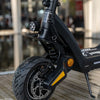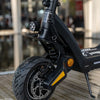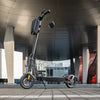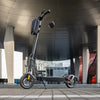Electric Scooter Weight Limits: What You Need to Know Before Buying
When shopping for an electric scooter, people often focus on speed, range, and battery life—but ignore a critical factor: weight limit. Exceeding a scooter's capacity can reduce performance, cause long-term damage, or even result in accidents.
Here's everything you need to know about electric scooter weight limits—and which GTXR models are best for different body types or riding needs.
Why Weight Limits Matter
Motor strain: Overloading forces the motor to work harder, leading to overheating or reduced lifespan.
Battery drain: Heavier loads reduce range and speed.
Braking efficiency: It takes longer to stop a heavier rider, especially downhill.
Structural safety: Frames not designed for heavier riders can weaken or bend over time.
Average Weight Capacities by Category
Light commuter scooters: 100–120 kg
All-terrain scooters: 120–150 kg
Heavy-duty models: 150+ kg
GTXR Scooters by Weight Capacity
GTXR C91: 100 kg – Great for everyday commuting
GTXR DT06: 120 kg – Reinforced frame and motor
GTXR G50 (with Happyrun): 150 kg – Fat tire, heavy-duty all-terrain build
Tips for Heavier Riders
Choose larger tires for balance and shock absorption
Avoid lightweight “portable” models—they sacrifice strength for portability
Opt for scooters with dual brakes for better stopping power
Consider upgraded suspension systems
Conclusion: Know your weight—and your scooter's limits. GTXR offers models for every body type and riding condition, built to deliver both safety and performance.





